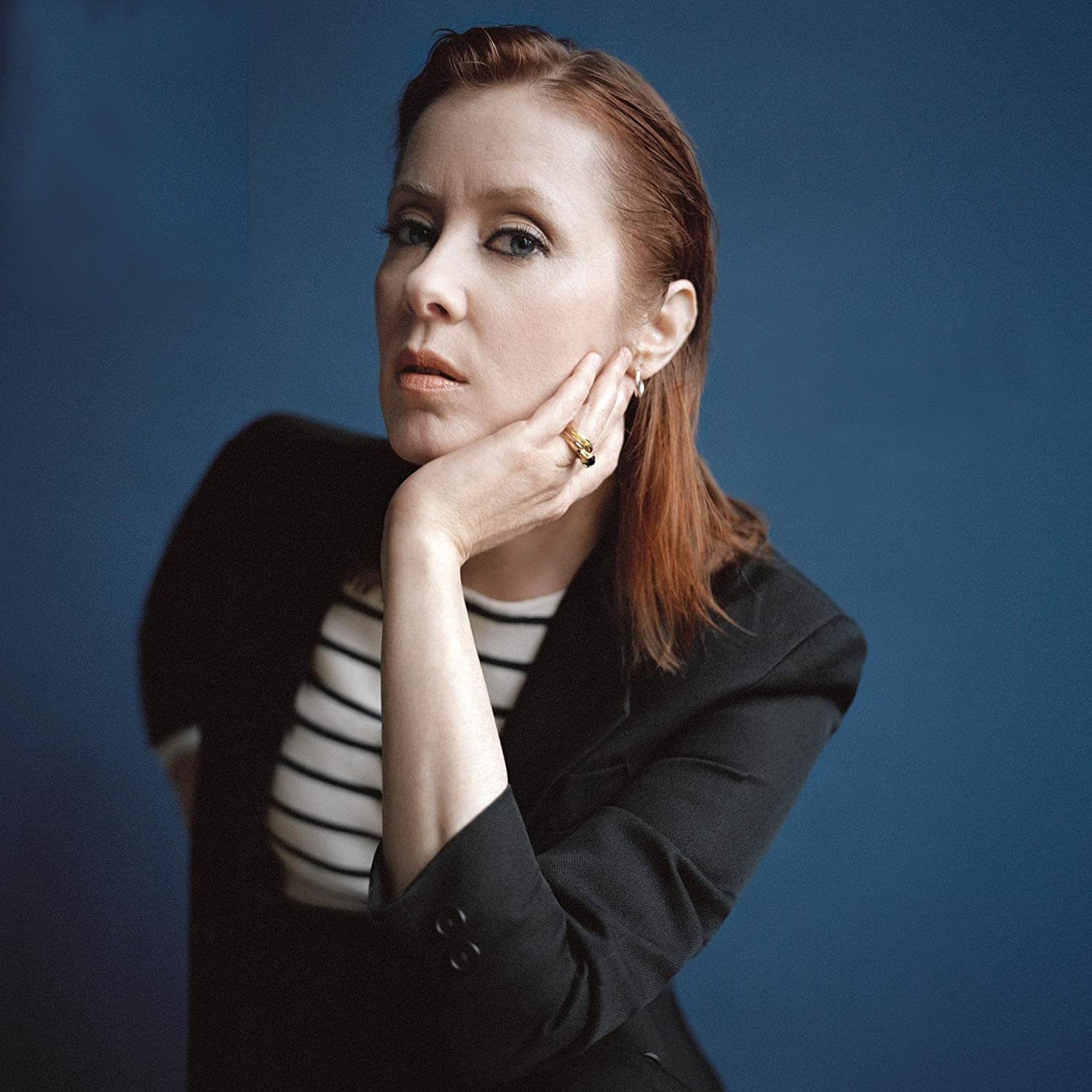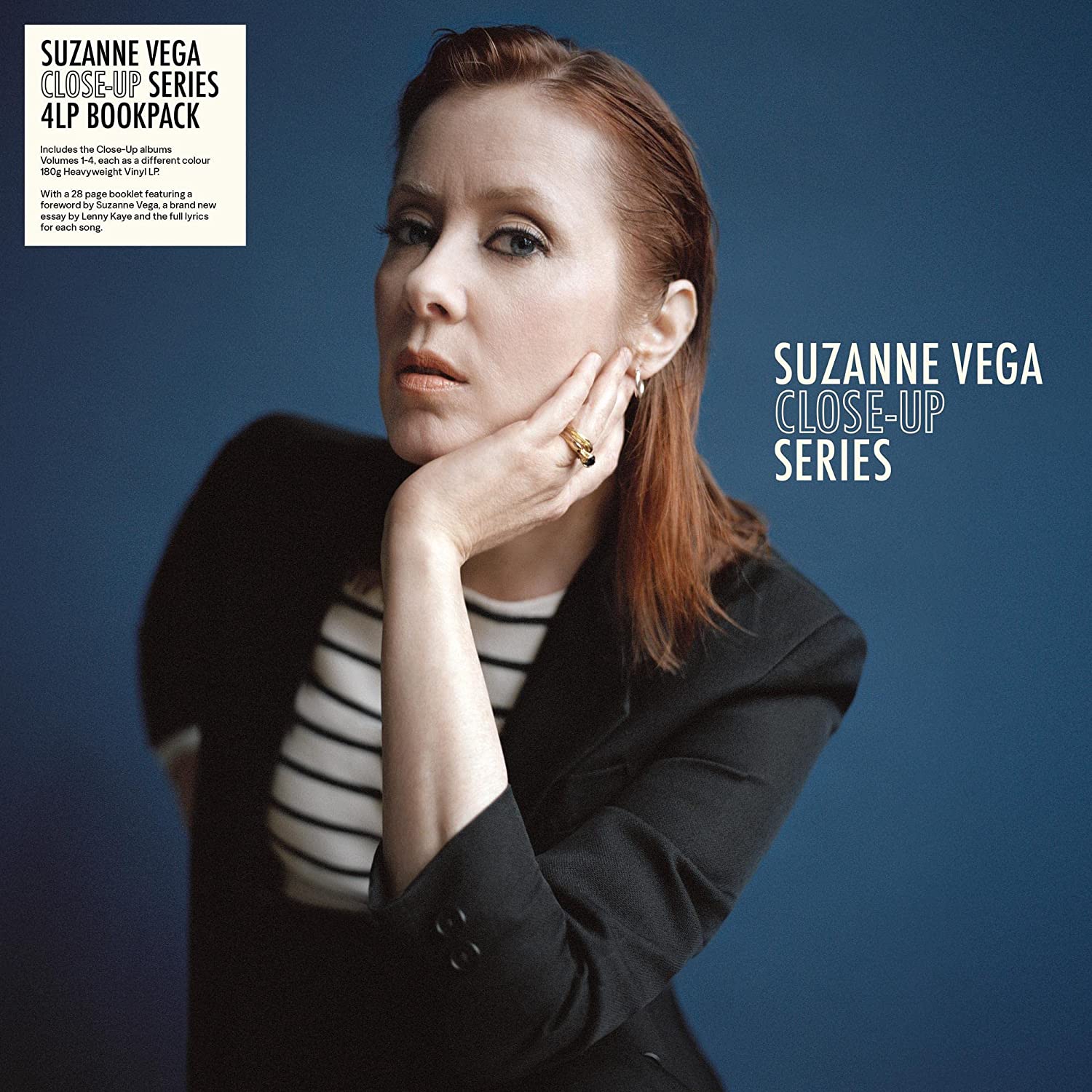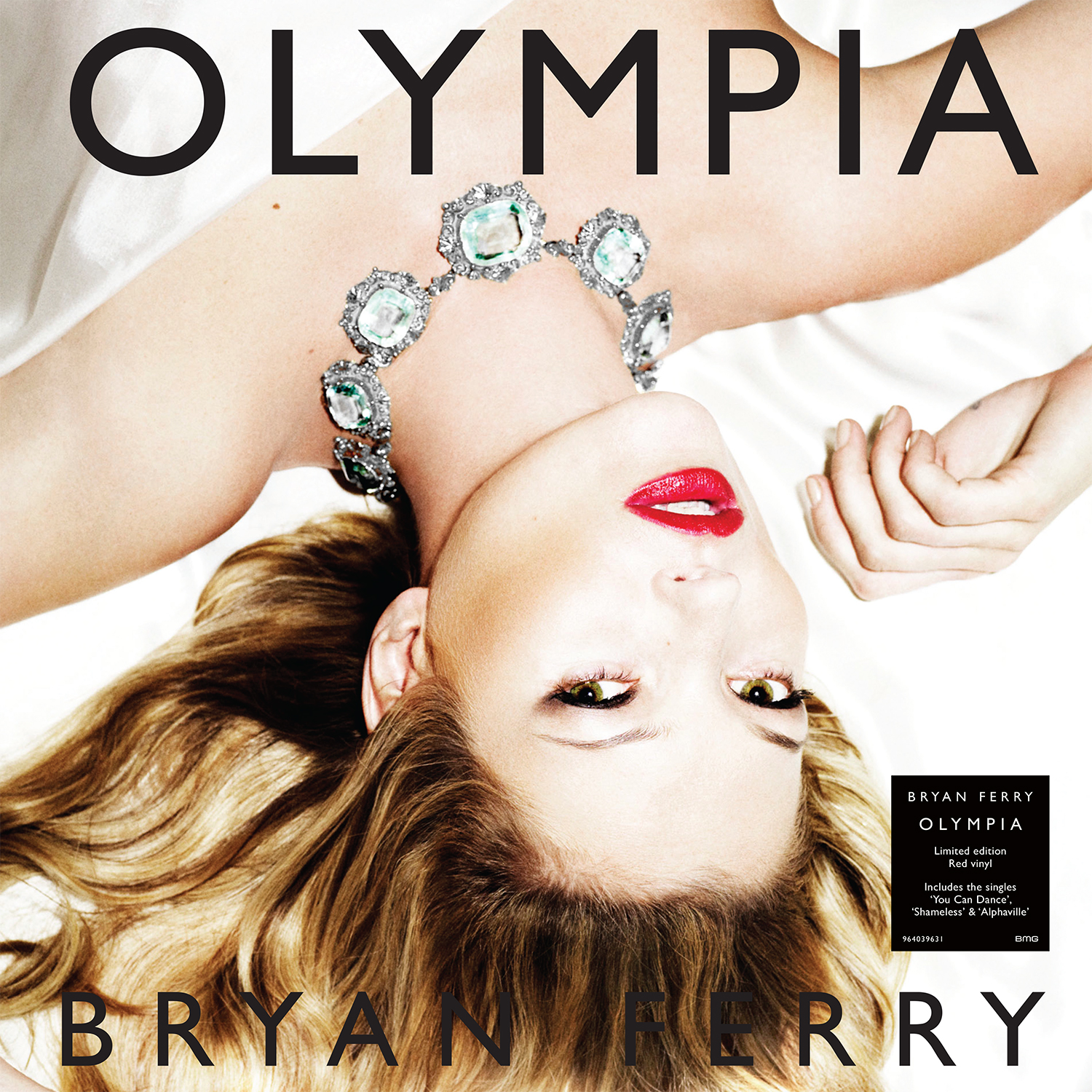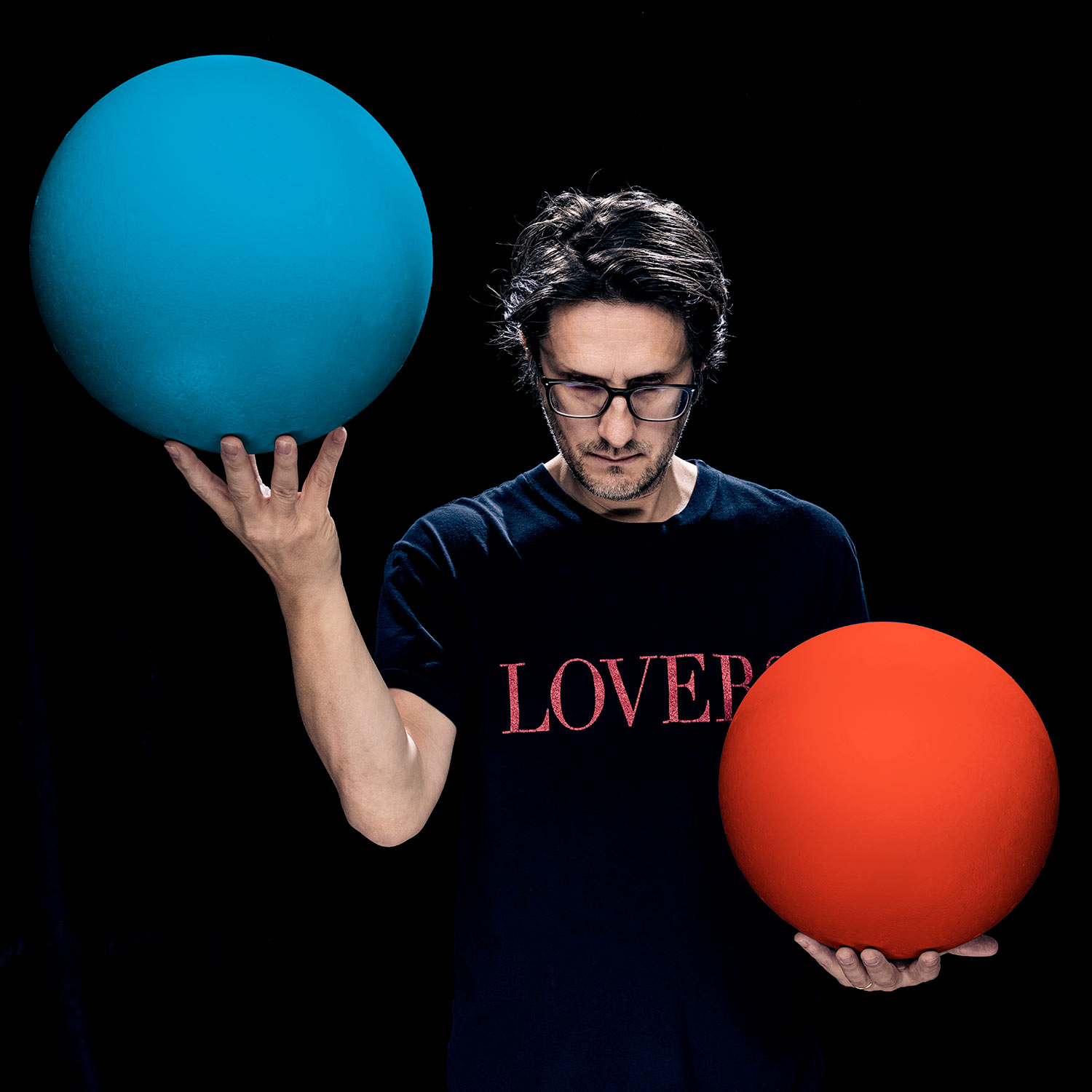Close Up with Suzanne Vega
The SDE interview

Around 10 years ago, Suzanne Vega’s Close-Up Series saw the singer-songwriter re-record swathes of her back catalogue and release newly-curated volumes of re-interpretations stripped of their original productions. Four volumes were issued: Love Songs and People and Places (both in 2010), States of Being (2011) and Songs of Family (2012). These were primarily CD releases, although limited black vinyl pressings were issued at the time.
Today, a special coloured vinyl 4LP vinyl deluxe set is released and SDE recently caught up with Suzanne to ask her about the initiative.
SDE: What was your original thinking behind starting the Close-Up series? Was it financial, artistic, or was it just about getting some control back over over your songs?
Suzanne Vega: It was all three of those. And it had a lot to do with the timing. Because my relationship with A&M had come to an end in the early 2000s, which I sort of knew would happen. But I had been enjoying what turned out to be a very short-lived relationship with Blue Note Records. I loved Blue Note, I love being part of Blue Note – I had a great time there. But I had an album, one album [with them], that came out and won a Grammy and then I was dropped! [laughs]. I mean, this was after [just] two years, which was a shock. I think that happened in 2008. So I was left there and didn’t really have the heart to go hunting around for a new major label deal. At that point, I think Facebook had just gotten started and I wasn’t in the mood to write a bunch of new songs and try and figure out where the audience was, so I thought if I start my own label and re-record the older songs, this will give me a bit of a catalogue for the new label. My goal at that point was 100,000 people on Facebook that I could market to and get to know through social media. And now we’ve far surpassed all of that. Amanuensis [the name of the Suzanne’s label], has been up and running, I think, since 2011. And it’s doing great every year, there’s a profit and I’m very happy with it.
What were the challenges, when it came to starting your own label? Obviously, there’s a lot of things involved in doing that. Did you get to grips with it quite easily?
I got the gist of it quite easily, because I had a manager who had done it before. I had been watching Aimee Mann’s career, and Michael Hausman, who was my manager then, helped her to set up her label. I saw how well it worked, so I knew he would be able to do that for me. And so that worked out pretty well. No, the only difficult thing, I suppose, was the actual re-recording. I found myself just getting a cold sometimes, you know, that sort of thing. And [Irish guitarist and former Bowie MD] Gerry Leonard and I worked out the newer, more intimate, more acoustic arrangements. But all that was a pleasure, really. And it was great finding a theme for each CD. That was a lot of fun. And so overall, it was terrific.
But did you have any hesitation, because you are unpicking the original art, if you like, which is a sequenced album where you wrote the songs, you chose the order of the songs on the record, a record which tells some kind of a story. In effect, with this Close-Up series of releases, you’re kind of unravelling that. Did you think much about that in terms of the relationship between the original and the re-recordings and how fans might view one against the other?
Yes, I thought a lot about it, actually. In fact, I was thinking of it again, recently, when Taylor Swift made the choice to re-record all of her albums. I really felt there was no point in trying to re-record the albums as we had done them.
I really felt there was no point trying to re-record the albums as we had done them
Suzanne Vega
First of all, my career is very long. I mean, I have decades of work to look back on. And not only that, but the some of the work that I’ve done with the various producers has been very idiosyncratic. The work I did with Mitchell Froom and Tchad Blake [1992’s 99.9F°], have all kinds of odd sounds, breaths, double tracking, you know, odd moments that just happen spontaneously, so there was no way I was going to be able to re-record that. Not to mention that we had all these musicians… We used musicians from The Attractions on 99.9, and also Jerry Marotta, who had worked with Peter Gabriel. So I didn’t want to recreate all of that; I felt that all of that existed, and that was great. I really wanted to introduce people to the newer material, because people gravitate towards the first two albums. Therefore, for the Close-Up Vol 2 album, you get ‘Luka’ and you get ‘Tom’s Diner’, but you get a lot of other newer material too. It really meant a lot to me to have the fans hear the new newer material as well as the old.
I have the CD box and you say in the notes that these re-recordings are a “gift to fans”. What did you mean by that?
I meant, for example, that it’s obvious that these are not meant for mainstream airplay, or they’re not going to go top 10 or top 40. These are reinterpretations that are very intimate. And it’s it’s not just that the songs are intimate and that the arrangements are intimate. The way Joe Blaney engineered the music – especially if you listen to it through earbuds or airpods – you feel as though I’m singing into your ear directly. So I really am there in the room with you. And to me, it’s what I always got from Leonard Cohen’s recordings, the sense of intimacy and the sense that he was singing to me, alone. Leonard Cohen is not a guy who had top 40 hits here in America, but that never mattered to me. So that’s what I meant by a gift to the fans… The sense of intimacy and the sense of ‘this is for you’. I am now singing to you and to you alone in your room.
John Lennon once said he wanted to re-record all The Beatles songs over again, and I think that’s very much an artistic trait. People sometimes look back at their work and wish they’d done it slightly differently. Did you enjoy the process of having a second stab certain songs, and maybe taking some of the production away? Perhaps removing an era-specific element to the sound and making them a bit more timeless?
Yeah, I suppose there’s an element that I enjoyed, but I also have to say, I really stand by the original recordings, as well. I think that ‘Luka’ as a hit single really works on the Solitude Standing album, but it also really works as a more intimate, folkier song. So I didn’t mean it as a correction. A song like ‘Blood Makes Noise’, I think the original is is just a unique piece of production that we couldn’t recreate, even if we had tried. The one song I thought really came into its own was a newer song called ‘Bound’ from the Beauty and Crime album. That one had a lot of production on it, and when you strip it down to just the guitar, it’s very poignant, I think, and very kind of haunting. That’s one where I feel the production being stripped away really revealed the song.
Regardless of the nature your relationship was with A&M, I noticed that they weren’t really doing anything with your catalogue. Were you unhappy that they weren’t working it and putting out expanded boxsets and the like, or did you not want that to happen in the first place?
I saw the writing on the wall. A lot of it is the backstage politics. You know, once [co-founder] Jerry Moss had sold A&M, it really wasn’t A&M anymore. The logo still existed, but it wasn’t Jerry Moss and Herb Alpert [anymore]. Once they were gone, I had to work with Jimmy Iovine, and he is a completely different guy with different tastes, different values. So I saw the writing on the wall, and I knew that I would be dropped, sooner or later. Not that he was a bad guy, but he wasn’t going to promote anything I did. That wasn’t his priority. So that’s how I felt. A&M in its prime was a great label, and it was really an artist’s label. When I got dropped from A&M, I contacted Jerry Moss and I said, “I just want to say thank you for the years that I spent on your label”. I got to do exactly what I wanted, whenever I wanted to and it was great. We had a great lunch where I got to express thanks. And we left it at that.
But even 15 or 20 years later, they weren’t really doing anything with your back catalogue. The original albums are all still in print, I think, on CD, but they weren’t releasing anniversary editions, which would have been the obvious thing to do…
I noticed that, but I also noticed that whenever I came out with something on my own label, sometimes they would put out a rival product, and I was like, you know, why can’t we work together? If you’ll help me, I’ll help you. If you put out a product, I’ll help you. If you give me an advance, I’ll do some promotion for you. But they didn’t even want to talk about it. So that put me in the weird position of having to rival myself. And my old product. So I thought that was a bit silly, and I still think it is a bit silly. It’s such a changing world, because I know now that people are trying to get their masters back and I’m trying to figure out if I should try and fight them to get my masters back? Or do I just take the pittance that they throw at you to make you go away? [laughs]. I’m at that moment now where I’m trying to decide which way to go.
A&M don’t want to work together. They’ve made that clear.
Suzanne Vega
Reissues and back catalogue is quite big business now, so it’s an obvious thing to do, to work with them to put out some box sets and things, I guess.
Yeah, but they don’t really want to work together. They’ve sort of made that clear. So it’s either I get my masters back and then do what I want with them, or take the money that they offer and relinquish any say in the matter. Many of the really big names have there masters one way or the other, but most of us don’t. And they had language in the contract at the time of signing, that it was “work for hire”, foreseeing this day, when 35 years would have gone by. So they made it very difficult even back then. But you know, we’ll see. Times are changing. I sometimes think that the world is more artist-friendly now. And people are starting to understand the issues behind these things.
I’ve worked on a few projects for Universal Music and even though they often don’t have to, they do seem to try to get the artists involved, when when they can, which is quite a positive thing, I suppose.
Yeah, I think it is. So maybe that would work. But it’s all in flux – the whole business world is in flux in a way I never had imagined. Back in the mid-80s, when I signed my record deal, I thought there were rules and laws and things were done a specific way. It’s really more that things change and the laws change to accommodate the times. No one could have foreseen that the the advent of the MP3 for example, which kind of brought down the whole industry. No one saw that coming. And so the laws have changed, because the laws have to change and maybe they’ll continue to change in the artist’s favour.
I wanted to ask you, Suzanne, about life on a major label, because you were commercially very successful in the early part of your career. You’ve experienced both things: major label, global success and now obviously you’ve now got your own label, which is a smaller operation. One of the things that people always say, is that “I may have been earning more money in those days, but I would never swap it for the kind of freedom that I’ve got today”. You know, “I might sell less records, but I’m happier’. Does that apply to you?
Yeah, I’d say that a lot of that is true. I mean, I loved being successful. It was a thrill. And it was great being successful in that way. You know, I sold five million albums before I was 30 years old, which I can’t deny, was thrilling. And I liked my relationship with A&M. But at the same time, I wasn’t attached to the lifestyle. I love performing, I love touring and I like playing to big audiences. And I also love playing to small audiences. I think I always knew that I wasn’t really cut out to be a top 40 artist – that was never my goal. The goal was to write songs; to write the kinds of songs that I like to write; to make my living doing it; and to find an audience that like me for who I was. And sometimes the audience is big, and sometimes it’s small. So that’s how I see it. And to be honest, I’m very happy with with my career, I do I have total freedom, and I can do what I like.
Back to Close-Up. When you first started, had you mapped out all the themes for the four albums, or did you just do one record and think, let’s see how it goes?
No, I had a spreadsheet for the four albums. I had laid it all out from the very beginning.
And did you have any ‘rules’? Some of them are quite acoustic, while others – I’m thinking of ‘Ironbound/Fancy Poultry’ on Vol 2 – have more sophisticated arrangements. Did you have any hard and fast rules or were you just adapting it to how each song needs to be arranged?
I adapted it according to how each song needed to be arranged. ‘Ironbound’ is a very difficult song for me to play, personally, on the guitar. So there were days where it was just easier to have Gerry [Leonard] do everything [laughs]. Because ‘Ironbound’ was written with a sort of ‘F’ chord shape, with the syncopation, and I just couldn’t always get it together to do that. And Gerry’s got a great range. You know, he can play folky acoustic music, he’s very Irish in that way. But he can also rock out and really do whatever is needed. So I just I tried to keep the mood intimate, even if the actual production wasn’t always just acoustic guitar.
I’m guessing the more ‘produced’ some of the songs became, maybe the less fun it was, because the whole point was to kind of keep it relatively simple?
No, no, the other ones were fun too. ‘Blood Makes Noise’ was fun. And I think even the sort of quasi remix version of ‘Tom’s Diner’ was fun. All of it was fun. It was all really cool.
I’ve seen you a live a few times and your voice is in great shape. I’m assuming you didn’t really have too many issues, singing songs that you recorded, in some cases, over 25 years ago?
Well, interestingly, I’m a person whose voice gets better the more I tour, so I’m pretty good at the beginning of a tour, but I’m even better in the middle of it, or near the end. The problem I had was that I kept getting colds, for some reason. And so that sometimes made it difficult sing. I think there’s a couple of spots… I can’t remember if it’s ‘In Liverpool’ where I clearly have a cold and we kept the vocal anyway [laughs]. So that was the only issue. I could sing great, as long as I wasn’t having the dreaded cold.
Obviously, these all came out on CD originally. It probably would have been really expensive to do vinyl on your own fledgling label back then, and there wasn’t the ‘vinyl revival’ at that time anyway. But what do you what do you make of vinyl? Is this a preferred medium for you? Or are you just giving the marketplace what it wants at this moment in time?
Well, it’s not really a preferred medium for me. I grew up with vinyl but I’m not really picky about my choice of how I listen to music. I listened to vinyl back in the day, but I also had a transistor radio when I was eight or nine and thought that was the coolest thing ever. And it was totally compressed and probably sounded like garbage to most people. But you know, you could get the lyrics, you can get the rhythm, and back then there was nothing cooler than to walk down the street with holding it up to your ear. So I’m not one of these people who needs like all my components and the subwoofers and the tweeters and everything to be perfect. I just grab it where I can get it [laughs], basically.
That’s a good quote! [laughs] Do you still buy physical music? Do you still think physical music is important? Or do you not think the medium is that important?
I do. I still think that the medium is important. I still like CDs. I still like albums. If I really love someone, I’ll buy the CD because I’ll always have some kind of CD player around that I can listen to it [on]. I think it’s important not just listen to someone’s singles, but to figure out what what the larger statement is.
What do you make of the vinyl revival then? In many ways, it’s quite positive, isn’t it? Because in some cases you’ve got kids that might have illegally downloaded or may have been happy to listen to music on YouTube…They’re now going out buying the physical product.
I love it. I think it’s great. I remember when my daughter was in college hearing that people were having listening parties where you would get together and actually enact the ritual of putting the vinyl on and listening to the first side and then turning it over and listening to the second side. And to me, that’s that’s pretty cool.
I went on Spotify and had a look at Luka, and compared how many plays the Close-Up version has had versus the original version. The original’s got 40 million, which is very impressive, but the Close-Up version has had 25 million, which is also very impressive.
That’s great.
Now I’m the record label owner, I get a significantly bigger percentage
Suzanne Vega
I’m not expecting you to give me detail or anything, but what difference does that make to you? Your new version, the one you own, that has 25 million plays. If it didn’t exist then you wouldn’t have got your extra cut, whatever it is. Is that meaningful? Because everyone always says with Spotify you get 0.00 whatever percent it may be, per play?
First of all, I’m just happy spiritually, to know that 25 million people listened to my [new] version of it, you know, I’m just happy to have made that connection, I think that’s really great. That’s much more than I had expected when I recorded it. I was thinking of it as something smaller. But the other thing that affects the bank account is that now I’m the record label owner, so I get a significantly bigger percentage. I think I get up to 60%. I don’t get whatever you get if you’re just the artist. I shouldn’t really talk without knowing my facts, but I don’t know the actual percentages. But I do know if you’re the record label, you get a lot more than just what you get as the artist. So there is some of that money is trickling its way to me in some form. So for that I’m thankful.
What’s next for you?
Oh, a couple of things. One is that I made a film of the play that I wrote about the life and work of Carson McCullers. So I am having a world premiere at South by Southwest. So that’s kind of the immediate thing that I’m all wrapped up in, I’ve been helping to design the poster for that. And then after that, I want to write a bunch of songs and come out with a new album – hopefully sometime next year. That’s what I’m aiming for and hoping for.
Is the Close-Up series finished? Is that now a closed book?
No, no, I always had intended to reinterpret it, maybe continue with different volumes, so I don’t think of it as a closed issue. But in the meantime, I’m also doing new material and releasing that. And then, you know, maybe at some point, I could do re-releases. Yeah, it’ll be a fun project, pretty much for the rest of my life, the way I see it.
Suzanne Vega was talking to Paul Sinclair for SDE. The Close-Up 4LP coloured vinyl box set is out today. It’s sold out in the UK but is still available internationally.
Compare prices and pre-order

Suzanne Vega
Close Up Series 4LP vinyl box set

|
|
||||||||||||||||||||||||||||||||||||||||||||||||||||||
Tracklisting

Close-Up Series Suzanne Vega / 4LP coloured vinyl box set
-
-
LP 1: Close-Up, Vol 1, Love Songs
Side A
- Small Blue Thing
- Caramel
- (If You Were) In My Movie
- Gypsy
- Marlene on the Wall
- (I’ll Never Be) Your Maggie May
Side B
- Harbor Song
- Headshots
- Songs in Red and Gray
- Stockings
- Some Journey
- Bound
-
LP2: Close-Up, Vol 2, People & Places
Side A
- Luka
- Zephyr & I
- New York Is a Woman
- In Liverpool
- Calypso
- Fat Man and Dancing Girl
- The Queen and the Soldier
Side B
- Rock in This Pocket (Song of David)
- Angel’s Doorway
- Ironbound/Fancy Poultry
- Neighborhood Girls
- Tom’s Diner
- The Man Who Played God
-
LP 3: Close-Up, Vol 3, States Of Being
Side A
- Undertow
- When Heroes Go Down
- My Favourite Plum
- Solitude Standing
- Cracking
- Last Year’s Troubles
- Solitaire
- Tombstone
Side B
- Blood Makes Noise
- 50-50 Chance
- Penitent
- Straight Lines
- Pornographer’s Dream
- Instant Of The Hour After
-
LP 4: Close-Up, Vol 4, Songs Of Family
Side A
- Rosemary
- Honeymoon Suite
- World Before Columbus
- As You Are Now
- Soap and Water
- Widows Walk
- Blood Sing
- Bad Wisdom
Side B
- Ludlow Street
- Tired of Sleeping
- Pilgrimage
- Brother Mine
- The Silver Lady
- Daddy Is White
-
LP 1: Close-Up, Vol 1, Love Songs

 Interview
Interview



By Paul Sinclair
24